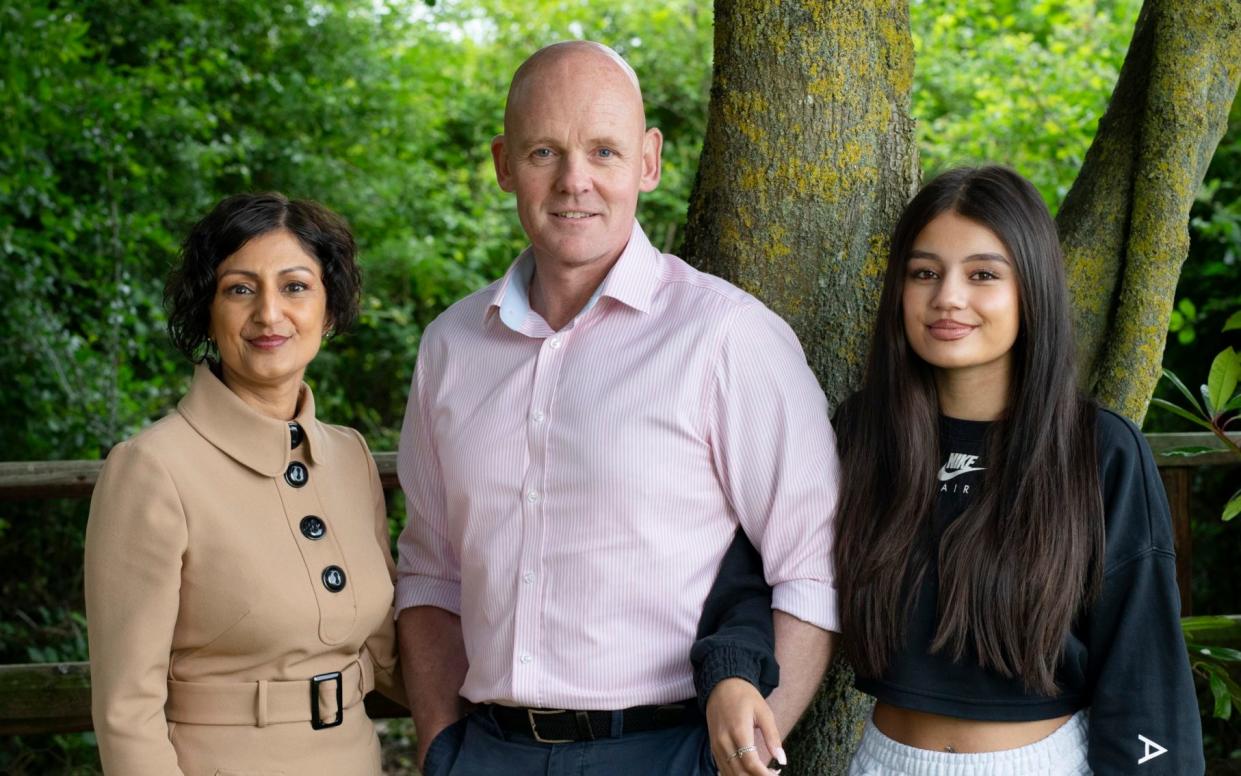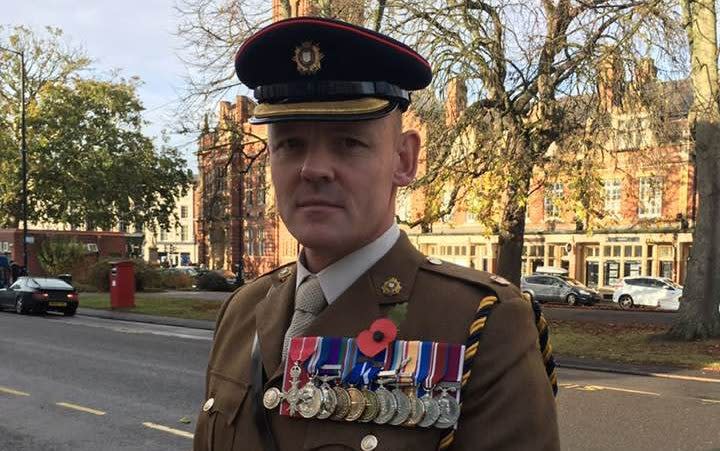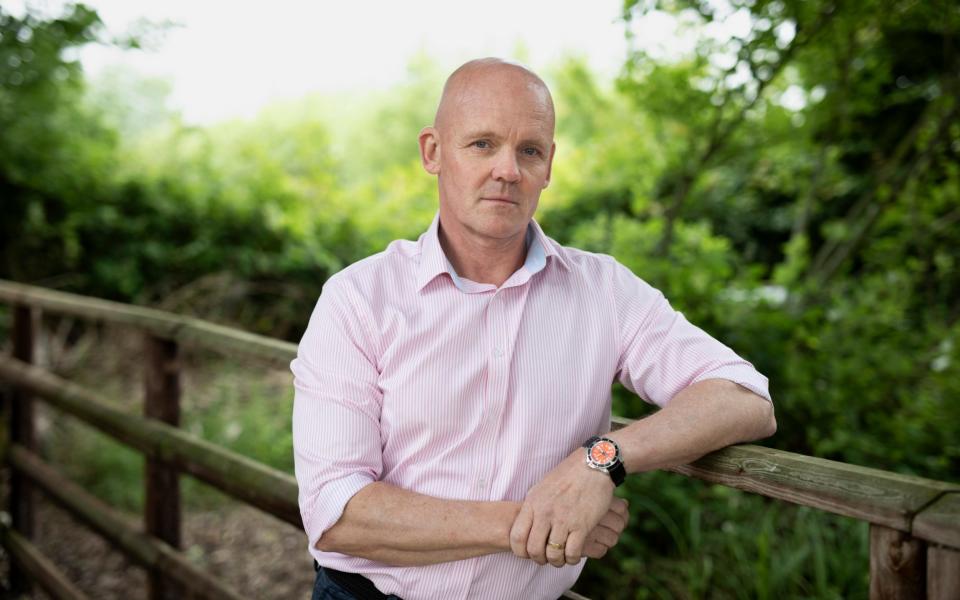‘I was thrown on to the slag heap by the MOD, but now a weight has been lifted’

Wayne Owers is the epitome of a modern military war hero – stoic, selfless and courageous.
He ought to be the Army’s poster boy, having joined up at 19 and risen through the ranks to become a bomb disposal officer, decorated by the Queen three times.
But his glittering career took an altogether different turn when he was diagnosed with post-traumatic stress disorder (PTSD), leading to him being prescribed antidepressants and eventually medically discharged, or “thrown on to the slag heap” as he puts it.
The 53-year-old from Warwickshire has been living with what he calls “the sense of dread” that accompanies his illness ever since.
At least that was until March this year, when The Telegraph reported on the Army’s “dishing out” of antidepressants to tens of thousands of personnel with PTSD and other mental health issues.
Retired Major Owers spoke to this newspaper at the time, explaining how the medication had left him feeling numb, and accusing the Ministry of Defence of resorting to the drugs “far too easily”.
His testimony, and others like it, resulted in the former soldier being contacted by a Human Givens Institute (HGI) therapist working for a charity called PTSD Resolution, which offers veterans and their families free counselling sessions to help them better cope with their conditions.
Owers, who has a wife, Sukie, and 16-year-old daughter Poppy now says the treatment has been life-changing. “I want to thank The Telegraph because that article has changed my life. The last two months have been revolutionary. I haven’t felt this happy and positive in years,” he says.
An MoD source said: “The armed forces take mental health very seriously and do offer therapy. But they can’t offer the bespoke services offered by charities like PTSD Resolution.”

Owers’ battle with mental illness began in 2009 after returning from a bloody and arduous six-month tour of duty in Afghanistan. There he led a team of bomb hunters finding and defusing improvised explosive devices (IEDs) hidden in the Helmand Valley by the Taliban.
It was dangerous work in what was then the most deadly place on earth.
During his deployment, Owers’ team – call signed Brimstone 6 – defused 93 IEDs. Their feats saw him decorated with the Queen’s Gallantry Medal. But success came with a heavy price. Every member apart from Owers was wounded in a single incident when a soldier stepped on a non-metallic IED during a routine clearance operation in Wishtan, in the Sangin area of Helmand province.
“The place was littered with IEDs,” he says. “I think the Taliban must have known we were coming. A Royal Military Police soldier attached to my team stepped on the device. He suffered multiple injuries. My number two suffered blast wounds, as did my signaller. My infantry escort, whose job it was to watch my back while I worked on the bomb, was also seriously injured. He died several years later with his death being attributed to his war wounds. But I didn’t have a scratch on me.”
But while Owers’ team bore the physical wounds, he carried the mental ones. “I knew something had changed in me even before the end of that tour. When I got home I told another bomb disposal officer who said, “We all feel like that at first, but it passes’,” he says.
Unfortunately for Owers, the feelings remained. But rather than confront them, he tried desperately to lock them away. “Being a man and a soldier I got on with it and tried not to think about it. I knew that if I went down the official route of seeking help I would be risking my career,” he says.
Within two years, Owers was back in Helmand working in weapons intelligence.
“Looking back, I think it was due to the events surrounding the blast which took out my team when the helicopters flew in to take away the wounded. It was a very traumatic event which I had buried. “The unit I was working with was pretty risk averse but I had gone the other way and I thought that I was going to get blown up with every step I took.”

Returning home was a relief, but Owers’ PTSD symptoms were steadily becoming more apparent, even outside of the theatre of war. He started having nightmares and flashbacks, became hyper-vigilant and developed symptoms related to obsessive-compulsive disorder (OCD). He also became increasingly uncomfortable with large crowded areas. All this played out against the backdrop of running the Defence Terrorist Bomb Disposal Training School in Kineton, Warwickshire.
Rather than confront the issues, Owers again opted for the path taken by many other service personnel suffering from the after effects of intense trauma, and tried to ignore them.
However, in 2015, things began to unravel after a chance conversation during a bout of physiotherapy for a knee injury.
“The physio was asking me about my time in Afghanistan. After a few sessions she said, I think you need to see someone, I think you need some help,” Owers says.
“So I arranged an appointment with an RAF mental health nurse, which I kept secret from my chain of command. At that stage, I wanted to get my life back together and be the person I was before. But in the very first session he said: ‘Let’s cut to the chase. You’ve got PTSD. I can get you medically discharged with some compensation.’
“I was shocked and said, ‘I’m a late entry major and I want to be a lieutenant colonel. I’ve got a whole career ahead of me.’”
Owers, whose other military honours include an MBE for his second tour in Afghanistan and a Queen’s Commendation for Valuable Service in Iraq, was then offered a form of therapy called Eye Movement Desensitisation Reprocessing, designed to help process and recover from past experiences.
“It didn’t work for me because my PTSD is linked to multiple traumas. I was then given cognitive behavioural therapy and that was partially successful,” he says. “Then I was placed on anti- depressants and sent on sick leave. Suddenly I wasn’t doing the job I loved. I was at home on my own because my wife, who’s in education, was working. I was on drugs which made me feel like a zombie.”
On July 17 2017, Owers’ 27-year military career came to an abrupt end when he was medically dis- charged. Since then, he has spent the last seven years living half a life.
Today, however, Wayne finally feels as though he has a second chance, having had effective counselling. His HGI therapist has worked with him using the Rewind Technique, which places the patient in a deep relaxed state of semi-hypnosis before rewinding the brain and reprogramming it to overcome trauma. Owers was often triggered by noise from military helicopters, which instantly caused him to feel anxiety and fear. But while undergoing Rewind Therapy, his therapist focused his brain on when he was a very young child and how he was inspired and amazed by the machines.
The process of fast-forwarding and rewinding the two situations during the treatment reprogrammed his brain to recognise the sound of a helicopter as a positive thing, not linked to trauma but instead to his childhood experience of awe.
“I’ve now had six sessions and my life has been transformed. I can honestly say the treatment is revolutionary. My nightmares are subsiding. My OCD has diminished hugely and I no longer get anxious. As a family, we’re going to see Paloma Faith play. I wouldn’t even have considered that just a few months ago,” he says.
Now, Owers hopes others will follow his lead once again.
“I want to get the message out there and tell any veterans or their dependents who still have PTSD to get in touch with PTSD Resolution. They offer free therapy and it has changed my life and many others’ more,” he says. “For the first time in years I feel happy and contented, like a huge weight has been lifted.”

 Yahoo News
Yahoo News 
